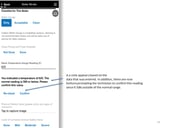 DevOps has become the gold standard for application development, but when it comes to mobile app development, it’s not always used — and when it is used, it’s not always used properly. So if you’re looking to get started using DevOps for mobile app development or are already using it and want to use it more effectively, we’ve got help for you.
DevOps has become the gold standard for application development, but when it comes to mobile app development, it’s not always used — and when it is used, it’s not always used properly. So if you’re looking to get started using DevOps for mobile app development or are already using it and want to use it more effectively, we’ve got help for you.
First, just a bit of background: DevOps is a technique that improves the development process by focusing on collaboration between product managers, developer and the operations staff, while aligning projects with an enterprise’s business objectives.
Several great tips about how to apply it to mobile come from a blog post on DevOps.com by Nasrullah Patel, titled, “Role of DevOps in Mobile App Development.” The first tip: Use continuous planning and integration. Continuous planning means getting the entire team of developers, project managers, operations staff, and others onto the same platform in order to define the scope of the app and put together a launch plan. And with continuous integration, the code created by developers is shared in a way that integrates it quickly with other code and allows for quick iterations of apps.
An Accenture white paper, “Bridging the Gap: DevOps in Mobile Development,” notes that continuous integration and fast iterations can use emulators and simulators in the early phases of app development. But after that, “getting the app thoroughly and comprehensively tested across real devices in real-world environments becomes far more important.”
The next tip by Patel is to perform continuous testing and monitoring to find bugs and performance bottlenecks and issues. Patel mirrors Accenture’s advice by saying that ultimately, the testing and monitoring needs to be done in a live environment, and that SDKs should be used to automatically create log and crash reports in order to find the root causes of problems.
Accenture adds that it’s not just the apps themselves that need to be monitored. APIs and code with which the app communicates need to be taken into account as well. Accenture says, “While an app may appear to perform just fine when seen in isolation, there may be other entities that don’t necessarily provide the same level of performance.”
Patel’s final tip: Use continuous delivery and deployment. That means that there’s no specific end to the development cycle — apps are constantly updated and improved.
Accenture adds a fourth tip: continuously validate the quality of the app. And not just of the app, but the process that creates the app. Accenture notes: “The continuous evaluation of efficiency and productivity can offer real insights into performance issues and solutions for making each successive regression smoother and more seamless.”
The Best Tool for Mobile DevOps
One thing that neither Accenture or Patel covered was specific tools you should use in concert with mobile DevOps. We suggest the Alpha platform, the only unified mobile and web app development and deployment environment with distinct “no-code” and “low-code” components. Using the Alpha TransForm no-code product, business users and developers can take full advantage of all the capabilities of the smartphone to turn any form into a mobile app in minutes, and power users can add advanced app functionality with Alpha TransForm's built-in programming language. IT developers can use the Alpha Anywhere low-code environment to develop complex web or mobile business apps from scratch, integrate data with existing systems of record and workflows (including data collected via Alpha TransForm), and add additional security or authentication requirements to protect corporate data.





Comment